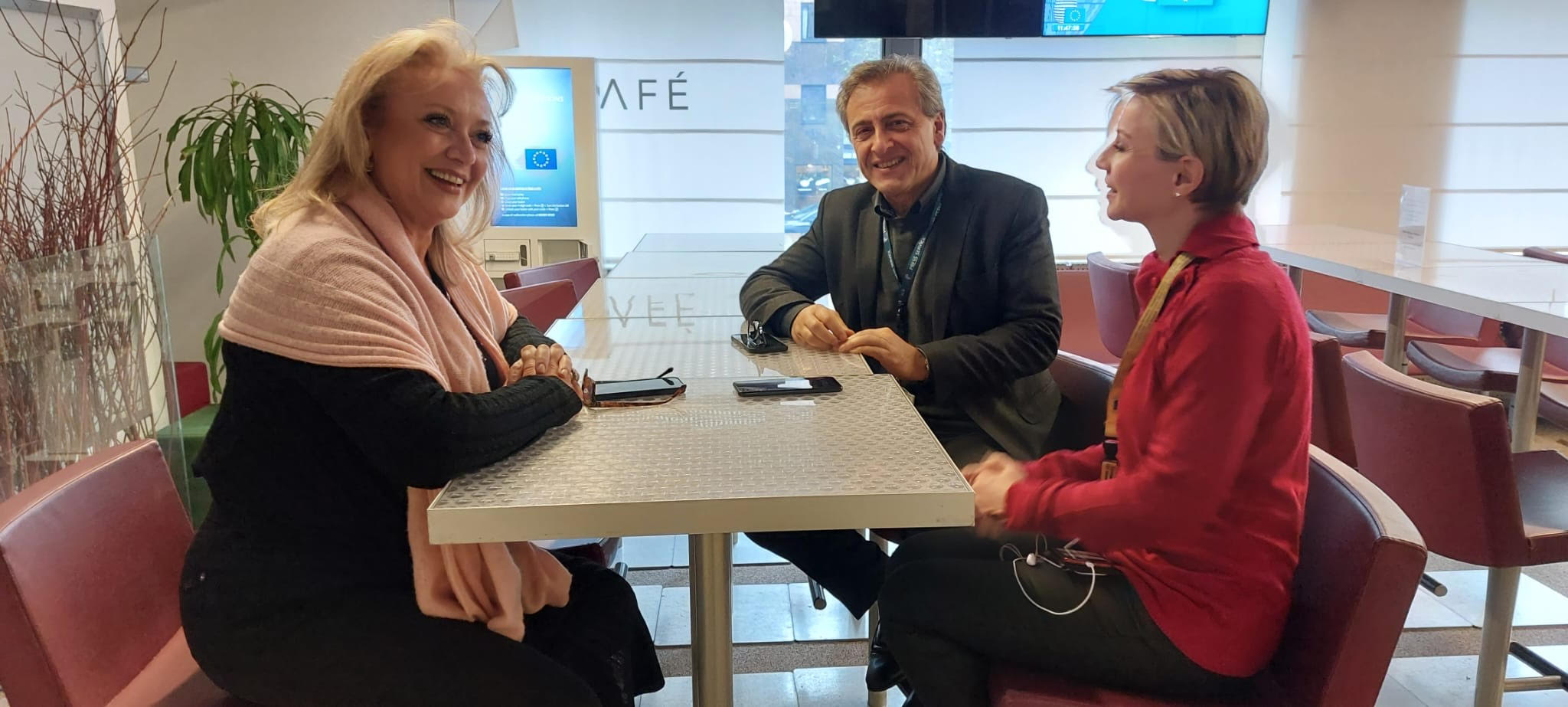They reveal what goes on behind the scenes at the EU Summits with tales of Jacques Chirac’s beer, Angela Merkel’s sweet disposition, Greece’s savior Jean-Claude Juncker, Xavier Bettel’s link to Thessaloniki, and Danish Prime Minister Mette Frederiksen’s relationship with lifts. Little details from the late nights and tough negotiations that are part and parcel of every meeting of the European Council.
Stavros Spyridonos is someone every journalist is familiar with, and every Greek reporter knows well. Born in Brussels to a father from Samos and a mother from the Peloponnese, he is the first person you meet on the way to the office the Greek correspondents call home. He’s always happy to treat us to a morning coffee and, a little later, when the circumstances call for it, why not a tipple of raki.
He recalls the period of the economic crisis: “Born here in Belgium, I’d never had to face racism as a Greek. Back then, it was all in the little catchphrases people used: ‘bone-idle Greeks,’ ‘you spent our money,’ you did this, you did that. I was deeply hurt. My father worked down the coal mines. My mother slaved away, too, so we could make ends meet. Everyone who emigrated back then, as people who wanted nothing more than to work hard and earn a living here in Belgium… we felt it deeply. And I may not always have been terribly diplomatic in my answers. I was a little more aggressive still with those of my colleagues who took a more ironic line toward us.”
Vicki Papadimitriou, who works in the Council’s protocol department, remembers having to deal with similar treatment. Born and bred in Thessaloniki, she fell in love and moved to Brussels for her husband.
“As a Greek, it really wasn’t pleasant. Because when they were saying all those things in Greece—about us taking order from Brussels and Germany making all the decisions without sparing us a thought—there was anti-Greek feeling here in Brussels, too. A dissatisfaction with Greece. It wasn’t easy to do your job as a Greek employee of a European institution, and then, whenever I went back to Greece, I’d have to deal with ignorance and sometimes aggression there, too,” she explains.
We owe a lot to Juncker, who’s a philhellene through and through
Vicki knows from the inside how much various foreign leaders helped Greece, François Hollande and Jean-Claude Juncker among them. But also how, with the country on the brink of collapse, how out of step the SYRIZA government was with the Council and its savoir vivre.
“We owe them a lot, especially Juncker. He did what he could to bridge the yawning gaps,” she notes, listing some of the difficulties she had to deal with: “I’d see the Greek delegation talking and acting in a way that really wasn’t helping the different sides to communicate. This could be at a seemingly silly or simple level, too, like when I’d tell them “We have to go now, the cameras are waiting for us out in the corridor,” and they’d say “Let them wait”. And I’d have my manager on my earpiece, saying: “Where on earth are you? Why haven’t you come out with the others?”
Of course, apart from helping Greece, Juncker was also famous for the smoking cabins that were set up because he was an unrepentant smoker.
The other side of Angela Merkel
There’s a side to Angela Merkel that’s completely different from the mental image everyone has of her as a tough, inflexible German. Vicki speaks about her “sweet personality,” while Stavros reveals that she didn’t want the cameras filming her on her way to the bilateral meetings. As for the Danish Prime Minister, Mette Frederiksen, she only uses the stairs and never the lift.
French President Emmanuel Macron (whom another leader used to call “Manolo” in a friendly way) is also very polite, but a very different regime, with all sorts of restrictions, is put in place when an American President attends a Summit.
Vicki describes Barack Obama as smiling and at ease, while Donald Trump was more sullen and took a different approach.
Jacques Chirac’s coffee
Stavros recalls a scene with Jacques Chirac, who he says always “had a smile on his face and greeted everyone, while Helmut Kohl was more serious”.
“Once, Jacques Chirac said to me: “My good sir, could you explain to my associate how to make a good cup of coffee, because the stuff he makes me is simply awful?” Stavros recounts. Of course, the French President from 1995 to 2007 didn’t only drink black coffee, he also enjoyed a beer, though never wine.
Wine is served at the leaders’ dinners, however. Sometimes, the Council Presidencies bring their own wines, as was the case with Croatia. A special procedure is also followed for selecting the menu. First of all, the specific tastes of each leader are known.
Meals are decided on by the head of protocol
Of course, every menu also demands a particular type of service, and there are rehearsals beforehand so we can see what the food looks like, so we’re prepared,” says Vicki.
Hungarian Prime Minister Viktor Orbán and Vladimir Putin present a very different image, though the two are themselves very similar. The Turkish delegations are usually difficult, too, in their own way, with behavior and demands that most closely resemble those of the Americans, they both tell us.
But the prize for their favorite politician goes to Xavier Bettel, the former Prime Minister and current Foreign Minister of Luxembourg. “Always smiling, cheerful and with a great sense of humor. What’s more, since he found out we have something in common, namely Thessaloniki, where he studied as an Erasmus student, he always greets me in Greek,” Vicki recalls.
And history continues to be made in front of and behind the cameras at the meetings of the European Council.



